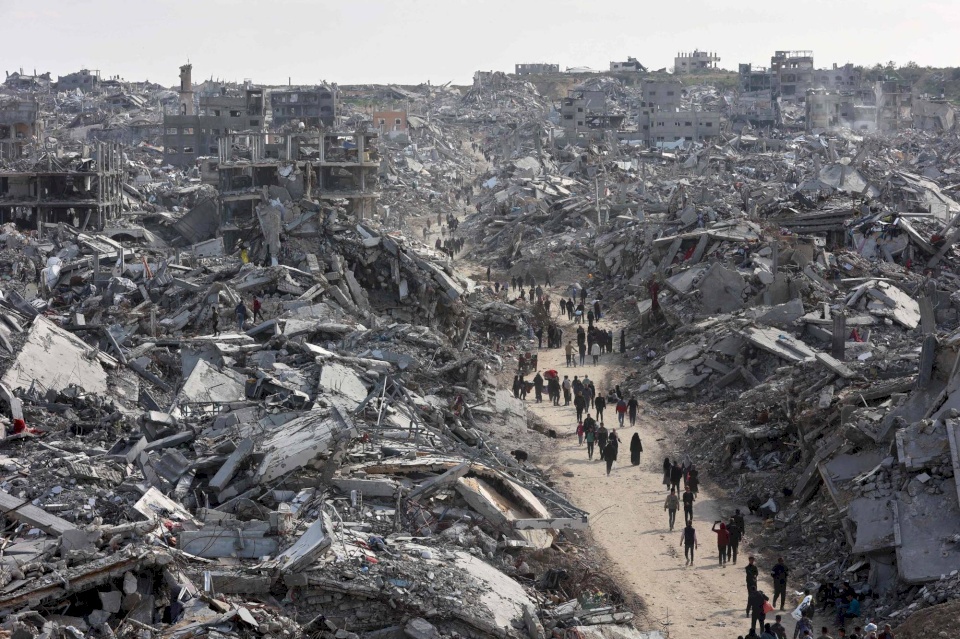
UN Report: Gaza War and Restrictions on the West Bank Destroy Decades of Economic Growth
SadaNews - A UN report released on Tuesday stated that the ongoing conflict in Gaza for the past two years, combined with the economic restrictions imposed on the occupied West Bank, has caused the worst recorded collapse of the Palestinian economy, thereby shattering decades of growth.
The report issued by the United Nations Conference on Trade and Development (UNCTAD) indicated that the Palestinian economy in the West Bank and Gaza Strip shrank by 30 percent in 2024 compared to 2022, which is the benchmark used to estimate the impact of the long war between Israel and "Hamas", according to "Reuters".
The report confirmed that this decline is the sharpest since data collection began in 1972, surpassing previous economic recessions during recurrent conflicts, including the Second Intifada following the failure of peace talks in 2000.
Pedro Manuel Moreno, UNCTAD's Deputy Secretary-General, told reporters in Geneva, "The situation is extremely concerning. The prolonged military operation, alongside long-standing restrictions, has driven the economy of the occupied Palestinian territories into its deepest downturn ever."
Gaza's recovery is expected to take decades. The per capita GDP has returned to its 2003 levels, erasing 22 years of developmental progress, and the report described the crisis as one of the ten worst global crises since 1960.
The report also pointed to the extensive destruction in Gaza, meaning the region will continue to rely on intensive international support for many years to come. UNCTAD economic expert Rami Al-Azza mentioned that "full recovery for Gaza and restoring its production to pre-conflict levels will take decades, assuming all conditions move in the right direction."
The UN report indicates that the Israeli war has devastated Gaza's economy and threatens the "survival" of the Palestinian sector, calling for "immediate and significant" international intervention.
The report estimated that rebuilding the Gaza Strip will cost more than $70 billion and could take several decades, warning that "UNCTAD" indicated that the war and restrictions have caused an "unprecedented collapse in the Palestinian economy".
It added: "Military operations have severely undermined every pillar of survival," from food to shelter and healthcare, "and have pushed Gaza into a man-made abyss."
It continued that "the ongoing and systematic destruction casts doubt on Gaza's ability to rebuild itself as a livable space and community."
Despite the ceasefire agreement coming into effect in Gaza on October 10, Israeli airstrikes continued, aid arrivals were delayed, and conditions remain dire. Al-Azza clarified that the per capita GDP in Gaza is $161 annually, approximately 44 cents daily, making it the lowest globally.
The Hamas attack on southern Israel in October 2023 resulted in the death of 1,221 people in Israel, mostly civilians, and sparked a devastating war that has lasted for two years in Gaza.
In contrast, Israeli aerial and ground bombings in response to the Hamas attack resulted in the deaths of at least 69,756 Palestinians, most of whom were women and children, according to figures from the Health Ministry in the sector, which the United Nations deems reliable.
The report re-emphasized: "Military operations have severely undermined every pillar of survival," from food to shelter and healthcare, "and have pushed Gaza into a man-made abyss."
It continued that "the ongoing and systematic destruction casts doubt on Gaza's ability to rebuild itself as a livable space and community."
The war has caused massive devastation in the sector and a humanitarian crisis that has reached the point of the United Nations declaring famine in some areas.
The scale of the destruction to the sector has "unleashed successive crises, economic, humanitarian, environmental, and social, pushing it from a state of developmental regression to a state of complete destruction," according to the "UNCTAD" report.
The report added that "even with projected growth rates and substantial support from foreign aid, Gaza may need several decades to restore levels of well-being that existed prior to October 2023."
"UNCTAD" called for a "comprehensive recovery plan" that combines "coordinated international aid, resumption of financial transfers, and measures to ease restrictions on trade, movement, and investment."
While the residents of Gaza face "severe multidimensional poverty," the UN agency also called for the launch of an emergency universal basic income, providing every individual in Gaza with an unconditional monthly cash transfer.
The report showed that Gaza's economy shrank by 87% during the period 2023-2024, bringing the per capita GDP down to only $161, among the lowest rates globally.
It also noted that the West Bank is experiencing its most severe economic recession ever due to the restrictions on movement, access, and loss of economic opportunities. Mutassim Al-Aqrab, from UNCTAD, stated that the rise in settler violence against Palestinians is preventing farmers from accessing their crops and livestock, adding: "This is one of many factors that undoubtedly harm the Palestinian economy and exacerbate the economic issues."
While the situation had not been as dire in the West Bank, the report found that "violence, accelerating settlement expansion, and restrictions on labor movement have also devastated the economy there, leading to the worst economic decline since UNCTAD began recording data in 1972."

High-level sources reveal to SadaNews: Washington seeks to hold a Gaza Reconstruction Conf...

9 Dead and Dozens Injured in Beit Shemesh, Shrapnel Hits Jerusalem, Haifa, and Tiberias

30 Bombs.. A "Unique" Moment Exploited by Washington and Tel Aviv to Target the Supreme Le...

Iran Confirms Khamenei's Death and Announces 40 Days of Mourning

Exclusive SadaNews: What is the Secret behind the Timing of the Israeli-American Attack?!

Israel Deducts 258 Million Shekels from Palestinian "Clearing" Funds for the Benefit of Fa...

Where Does the Second Phase of the Ceasefire Agreement Stand?!

